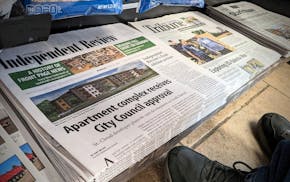Twin Cities suburban school districts racked up some impressive referendum wins Tuesday. There were some notable defeats, too.
Robbinsdale, Elk River, St. Louis Park and Inver Grove Heights were among those districts whose voters approved requests for more funds. But similar tax levy requests were struck down in such districts as Osseo, St. Francis, South St. Paul, Rockford, Buffalo and Jordan.
Statewide, results were also mixed. Twenty-two of 41 school districts requesting operating funds got at least some of the funding they wanted, according to figures released by the Minnesota School Boards Association. Out of 13 requests for bond and capital facilities funds -- used for construction, renovation, and big technology purchases -- seven were approved.
At first blush, that doesn't sound like a very good ratio of winners to losers, especially when millions of dollars in annual property tax revenues were at stake for any given district. Educators, though, considered it a decent batting average, especially taking into account voters' financial worries and all the noise surrounding the presidential and other national elections.
"I'm seeing more success than I expected," said Charlie Kyte, executive director of the Minnesota Association of School Administrators. "I was looking at the economic situation, and I thought, 'Holy smokes,' I was really expecting no more than seven or eight to pass."
Referendum requests passed with a 54 percent success rate, very close to the rate characteristic of referendums held in presidential election years. The passage rate during other years has been pegged at 60 percent.
One district that rebounded from last year was the northwestern metro Robbinsdale district, where two ballot questions totaling $9.4 million a year over seven years passed by wide margins. A year ago, voters turned down a much larger request, triggering budget cuts this year of $6 million.
Last year's referendum featured heated rhetoric, charges of distortion, and a big push by anti-tax activists to defeat the district's request. This year, district officials and volunteers credited the turnaround to massive, and personal, pro-levy efforts.
"We door-knocked every house in the district," said school board chairwoman Patsy Green. "That's about 46,000 homes."
Scott Croonquist, executive director of the Association of Metropolitan School Districts, is a Robbinsdale schools parent, and worked as a volunteer to help pass the levy. Croonquist and scores of other volunteers were assigned to make contact with the residents of the homes they visited, asking them to vote "yes" for the levy. He estimated he visited several hundred homes last weekend.
"That's what I think made the difference in Robbinsdale," he said.
Robbinsdale officials say they will use the funding to hire more teachers and reduce class sizes, restore some of the cuts the district made to programs and extracurricular activities this year, and to lessen the need to make future cuts.
Out of six Association of Metropolitan School Districts member districts that held referendums, five were successful.
"The high turnout brought out a lot of voters who tended to be more sympathetic and supportive of school referendums," Croonquist said. "And I think they had a pretty clear understanding that the schools making these requests needed the funding."
On the flip side, St. Francis schools, in the northern suburbs, failed in another effort to reap more property tax revenues. The district lost out in a referendum last November, and failed four times in its efforts to get voter approval for bonds to build a new elementary school. The district's last successful referendum was in 2003.
Osseo, another northwest suburban school district, was turned down by voters Tuesday after achieving partial success last November with passage of $31 million in funding a year over 10 years. The district still had to embark on $16.3 million in budget cuts that included laying off scores of teachers, shutting down two schools, and revamping the programs at four other schools.
"It's difficult for anyone to consider new taxes in the current economic climate," said superintendent Susan Hintz. Hintz said no big budget cuts would follow the district's referendum defeat. The money in the district proposal was meant to, among other things, hire back 40 to 50 teachers who were laid off because of budget cuts.
"Our voters said, 'No, not at this time,'" Hintz said. "Now, we'll take their decision and move forward."
Norman Draper • 612-673-4547

Former diversity worker sues University of Minnesota after firing over swastika photo

As longtime Hutchinson, Litchfield papers close, 2 newspapers launch to take their place

In Grand Rapids, Itasca Pride is planning its first event, but there is already pushback
Mother charged with fentanyl overdose death of her 8-month-old boy in Roseville hotel room
